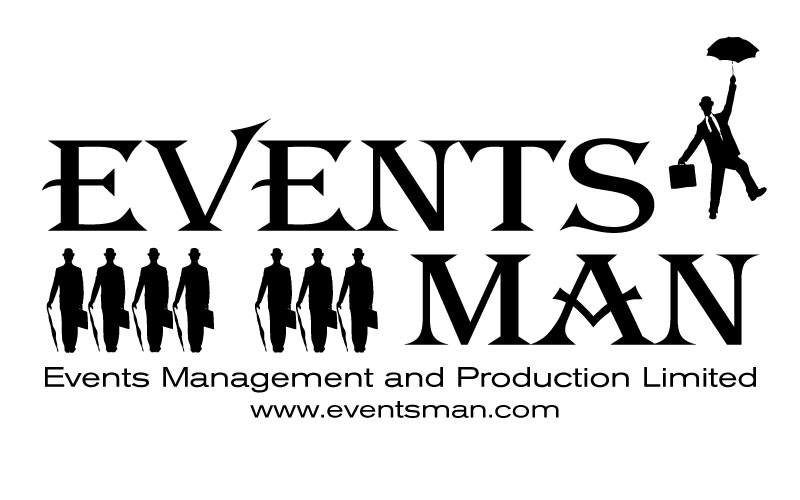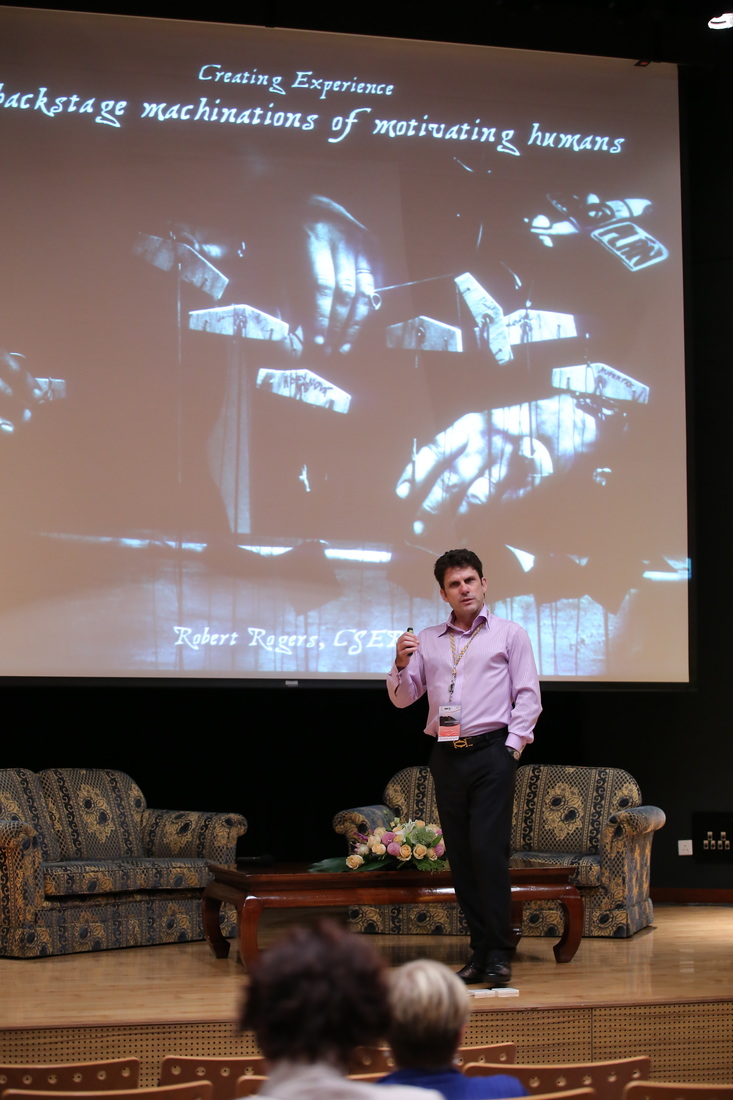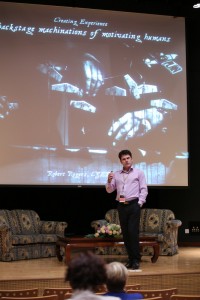ICE 2015 – Making Waves in Macau
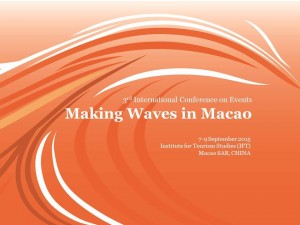 Over the years I have had the pleasure to speak and attend many events industry conferences. ICE2015 was my first academic conference. ICE2015 International Conference on Events, “Making Waves in Macau” was held early September and organized by IFT (Institute for Tourism Studies, Macau) I was asked to give one of the keynote speeches. I was told attendees were to be a mix of teachers, professors, students and industry people. I created my talk confident that I would be able to impart a bit of working knowledge and maybe inspire a few people. I was scheduled for after lunch on day 2. Day 1 as I introduced myself to attendees I started to get a bit nervous everyone I met were doctors and professors of event management and tourism from institutions around the world. Everyone was from top schools in event management, places like Bournemouth University (UK), The Australian Centre for Event Management, Edinburgh Napier University, Griffith University, Rosen College in Florida plus professors from Turkey, Seoul and Taiwan. I started to wonder just to wonder just what I could teach them.
Over the years I have had the pleasure to speak and attend many events industry conferences. ICE2015 was my first academic conference. ICE2015 International Conference on Events, “Making Waves in Macau” was held early September and organized by IFT (Institute for Tourism Studies, Macau) I was asked to give one of the keynote speeches. I was told attendees were to be a mix of teachers, professors, students and industry people. I created my talk confident that I would be able to impart a bit of working knowledge and maybe inspire a few people. I was scheduled for after lunch on day 2. Day 1 as I introduced myself to attendees I started to get a bit nervous everyone I met were doctors and professors of event management and tourism from institutions around the world. Everyone was from top schools in event management, places like Bournemouth University (UK), The Australian Centre for Event Management, Edinburgh Napier University, Griffith University, Rosen College in Florida plus professors from Turkey, Seoul and Taiwan. I started to wonder just to wonder just what I could teach them.
Day One
Day one opened with a presentation from the main sponsor Macau Government Tourism Bureau who highlighted the important role events play in marketing of the city to tourist, incentive groups and conferences. This was followed by a very interesting panel discussion from the managers of MGM, Venetian and Grand Hyatt Macau who talked about the future of Macau and their wishes for a better airport and the lack of hope in the upcoming bridge from Hong Kong. After an amazing lunch things got very interesting.
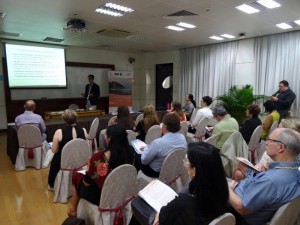 Academic conferences are an opportunity for professors, masters and PHD students to deliver papers on their latest research get some feedback from their peers before submitting them to journals for publication. Some had been working for years to complete papers on the latest findings in the field of event and tourism management. Each paper tends to focus on one subject or a single aspect of a subject. As is traditional in academic conferences they were given only 15 minutes to deliver the findings and then a short question and answer period. One of the biggest struggles seems to be summing up years of research into 15 minutes, luckily the conference was small with plenty of time to mingle so if you found a topic you were interested in you could corner the expert who was always happy to share the knowledge.
Academic conferences are an opportunity for professors, masters and PHD students to deliver papers on their latest research get some feedback from their peers before submitting them to journals for publication. Some had been working for years to complete papers on the latest findings in the field of event and tourism management. Each paper tends to focus on one subject or a single aspect of a subject. As is traditional in academic conferences they were given only 15 minutes to deliver the findings and then a short question and answer period. One of the biggest struggles seems to be summing up years of research into 15 minutes, luckily the conference was small with plenty of time to mingle so if you found a topic you were interested in you could corner the expert who was always happy to share the knowledge.
Strong Content
The ICE2015 conference topics and papers presented were widely varied with some incredibly useful for practitioners and others more useful for academics. Some of the papers delivered for academics included a look at event graduates early career paths from Lei Weng Si and Loi Kim Ieng of Institute for Tourism Studies, Macau as well as workshops on future implications for event managers in university undergraduate programs delivered by Arend Hardorff and Dr. Marisa DeBrito of the University of Applied Sciences Netherlands.
On the practitioner side there was a fountain of useful facts and inspiration. Case studies such as the evaluation of Aberdeen’s bid to become the UK ‘City of Culture 2017’, Insights from 25 years of the Mt. Kinabalu International Climbathon, and practical specific studies such as ‘The Workings of Safety Advisory Groups for Two Major International Events’ provided in depth knowledge into the inner workings of world class event management.
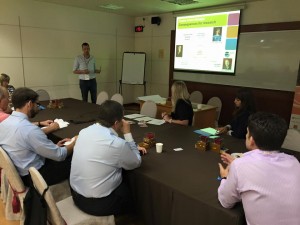 For me as a designer I was more intrigued with talks on motivation and experience. Miguel Moital and Amy Bain presented some interesting findings on “Emotional Reactions to The Consumption of Prestige in Events”. In their talk they showed some of the positive and negative emotions generated by prestigious events. Positive ones being feeling spoilt, lucky and proud. Negative ones coming mostly from the fear of missing out, regret and embarrassment of not being a part of it. Meanwhile I was taking mental notes on leverage prestige for the marketing of my gala dinners.
For me as a designer I was more intrigued with talks on motivation and experience. Miguel Moital and Amy Bain presented some interesting findings on “Emotional Reactions to The Consumption of Prestige in Events”. In their talk they showed some of the positive and negative emotions generated by prestigious events. Positive ones being feeling spoilt, lucky and proud. Negative ones coming mostly from the fear of missing out, regret and embarrassment of not being a part of it. Meanwhile I was taking mental notes on leverage prestige for the marketing of my gala dinners.
I was particularly taken by two papers. The first was the research done by Dr. Caroline Jackson on ‘The Lived Experience of Popular Music Festival-Goer”, Caroline interviewed dozens of festival goers about their festival experiences both good and bad. Through these she brings up the concept that in defining event experience it is both good and bad that create the experience. We tend to focus only on the positive aspects however it is the bad side that make the highpoints so much stronger. This concept makes me wonder as an event designer should we design lows in our events to make our highs better?
The other very interesting research delivered was from Professor Vern Biaett of Highpoint University in the US. Who is working on ‘The Emergence Of Organic Festivity Theory’. Vern explored onsite behavior of attendees at community festivals looking at their activity patterns. Noting that social bonding and social capital during passive events were limited to friends and family. When content shifted towards the more physical and emotional there was a direct increase in social capital created in every group. Vern believes that as our ‘Experience Economy’ progresses event designers and planners need to work on stronger sensory programing in order to compete in the event market. This is something I feel I knew intuitively however it is nice to have the language and reasoning to back up my crazy and fun ideas when I present to my clients.
My Keynote
After a very insightful and long first day I retired to my hotel room to reframe and rewrite my talk. I thought with this audience I had to move away from event management, tricks and tips that practitioners can use to make their events better to insights from the field and what we need from the new generation. My keynote “Creating Experience- The Backstage Machinations of Motivating Humans” evolved overnight to became more of a TED talk on event experience and human dynamics. As rehearsal was limited I fumbled and stumbled in a few places during the presentation and finished a bit early but the talk was generally well received and everyone certainly enjoyed the magical special effects as well as the artistic slides. I still feel very honored to have been asked to present to such a learned group and although I may not have taught them much hopefully I inspired and entertained a few. I look forward to adding all the new insight I learned from the ICE2015 Conference and presenting this talk again.
